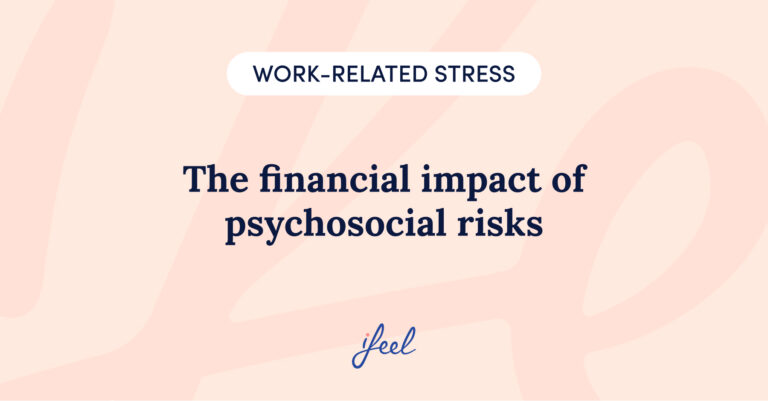Employees’ fear of being replaced by AI is real, and it’s not too hard to guess why. In a world where technology is advancing at a dizzying pace, artificial intelligence (AI) has positioned itself as a key solution to solving complex problems in various sectors.
Its ability to automate processes and improve efficiency has captured the attention of global organisations. However, this technological phenomenon also implies significant changes in the work environment, generating understandable employee concerns.
In this context, fear of AI is a natural reaction to uncertainty about the future of work and the transformation of traditional roles. This article explores how companies can turn these challenges into opportunities for growth and development.
In addition, to help in this process, ifeel has developed a free downloadable HR AI implementation strategy that will not only help you evaluate your processes, but will guide you step-by-step in adapting AI to your organisation.
AI and the labour market in Spain
AI and the Labour Market in the UK
The arrival of new technologies has prompted studies on their impact on work environments, revealing both benefits and challenges. Generative AI, launched in 2022, is beginning to redefine the UK labour market. According to a report by KPMG, 40% of UK jobs could see some impact from generative AI, with 2.5% of all tasks affected. However, around half of the displacement will be offset by the creation of new tasks linked to managing the new technology, potentially adding £31 billion to the UK economy over the next decade
Benefits of well-implemented AI
With proper implementation, AI can offer benefits such as:
- Improved productivity at work.
- Innovation
- Increased job satisfaction

Impact of employees’ fear of being replaced by AI at work
Integrating artificial intelligence into the work environment has introduced new challenges for organisations. Employees’ fear of being replaced by AI affects their perception of their future within the company and can significantly transform workplace dynamics.
Below, we explore how employees’ fear of being replaced by AI impacts key areas such as morale, stress and adoption of new technologies.
| Impact | Description |
|---|---|
| Reduced morale | Uncertainty about the impact of AI reduces employees’ sense of belonging and engagement. |
| Increased stress | Anxiety in the face of uncertainty and the future of work affects employees’ mental health and productivity. |
| Resistance to change | Fear of the unknown prevents the adoption of new technologies, resulting in organisational stagnation. |
| Deterioration of organisational culture | Fear generates discomfort and a poor working environment, affecting team cohesion. |
To avoid such consequences, it is vital to work on creating psychologically safe environments where employees’ concerns are openly addressed. This involves fostering a culture of transparent communication, where everyone feels comfortable voicing their concerns without fear of retaliation.
In addition, it is essential to implement well-being solutions that support mental health by fostering a supportive and collaborative environment. In doing so, organisations can strengthen the resilience of their teams and facilitate a smoother transition to the integration of new technologies.
On this, Lisa Porres, Chief People Officer at Spotahome, an ifeel partner company highlights:
‘Emotional wellbeing is fundamental to fostering creativity, the generation of new ideas and the determination to implement them; thus ensuring medium and long-term success.’
This underlines how our experts recognise the importance of proactively addressing employee concerns.
Practical exercise: Identifying AI-related fears
This exercise is designed to enable leaders to identify effectively and addresses employees’ fear of being replaced by AI
Step 1: Conduct anonymous surveys
Implement anonymous surveys to collect honest feedback from employees about their AI-related concerns. In these, questions such as the following can be implemented to facilitate the identification of employees’ fears. For example:
- How do you feel about implementing AI in your area of work?
- What aspects of your job do you think could be affected by AI?
- Is there any part of the AI implementation process that causes you concern?
- What support or training do you need to feel more confident with AI?
- Do you feel listened to when you share your fears about AI?
- How do you prefer to receive information and updates about AI implementation in the organisation?
Step 2: Organise listening sessions
Facilitating meetings where employees can voice their concerns involves creating a welcoming and confidential space where each individual feels safe to share their thoughts and concerns without fear of reprisal or judgement.
These sessions should be led by a neutral facilitator who encourages open and empathetic communication, ensuring that all participants have the opportunity to be heard and understood.
Establishing this environment helps build trust and strengthen team cohesion, promoting a more positive and collaborative working environment. In addition, group dynamics can be used to encourage active participation and the constructive exchange of ideas.
Step 3: Analysing and acting on feedback
Evaluating the collected information requires a detailed analysis to identify common patterns and themes among employee concerns. This analysis should serve as the basis for developing an effective action plan that addresses these concerns in a comprehensive manner.
The plan should include the creation of specific educational resources to help employees understand and adapt to technological changes. In addition, it is crucial to implement an ongoing support system that provides regular assistance and follow-up, ensuring that employees feel supported throughout the transition process.
This proactive approach not only mitigates fear, but also strengthens trust and commitment within the organisation.

Strategies to mitigate employees’ fear of being replaced by AI
To turn fear into opportunity, it is important for organisations to remember that employees are afraid of AI, and that this is a natural response to change.
To help in this process, ifeel has developed a free downloadable HR AI implementation strategy that will not only help you evaluate your processes, but will guide you step-by-step in adapting AI to your organisation.
Companies must be smart when including these new technologies, applying a series of effective strategies to make such implementation positive for everyone. These include:
1. Continuous training
Education is key for employees to adapt to a technological environment. In this sense, training should address:
- New competencies: Imparting technical skills and promoting problem solving.
- Adapting to change: Fostering a continuous learning mindset is crucial for employees to remain flexible and open to new ways of working. This helps reduce resistance to change and enhances personal and professional growth.
- Mental health training for leaders: Leaders must be trained to promptly identify and address their teams’ concerns. This includes developing active listening and empathy skills , enabling leaders to create an environment of psychological safety where employees feel heard and supported.
2. Open communication
It is crucial to foster an open dialogue between leaders and employees, allowing concerns to be addressed in the workplace. This not only helps to build trust, but also enables leaders to learn how to:
- Inform and educate: Provide clear and transparent information on how AI will affect roles and responsibilities. This helps reduce uncertainty and prepare employees for the changes ahead.
- Engage employees: Include them in technology adoption discussions, allowing them to contribute ideas and give feedback. This not only increases their sense of ownership, but also enriches the implementation process with valuable perspectives.
- Active listening: Develop the ability to listen to employee concerns and suggestions, showing empathy and understanding. Creating an environment where everyone feels valued and listened to is essential.
3. Offer mental well-being solutions for employees
To mitigate employee concerns about AI, relying on mental well-being solutions designed by expert psychologists, such as the one offered by ifeel is essential. These solutions, which integrate advanced technology with clinical knowledge, offer invaluable support to organisations in listening to and supporting employees. This enables:
- Access to resources: Providing access to mental health counselling and resources allows employees to feel supported at all times.
- Personalised counselling: Collaborate with mental health experts to provide specific, data-driven guidance, helping to identify and address AI-related concerns.
- Fostering organisational resilience: Promote an environment where mental health is a priority. This not only strengthens engagement, but also enhances organisational adaptability in the face of technological change.
By relying on these solutions, companies can create a safer and more positive working environment, transforming fear into an opportunity for growth and innovation.

Caring for mental well-being in organisations
Companies should address employees’ fear of being replaced by AI with transparency, effective communication, and appropriate training. In this way, AI can become a driving force for innovation and growth, enhancing human capabilities rather than replacing them.
To support companies in this process, our team of expert workplace well-being psychologists has created a mental well-being solution for businesses that improves talent retention, reduces presenteeism, and combats employee stress.
With our mental well-being solution, your company’s HR managers can receive personalised, data-driven advice on improving mental health at work. In addition, this solution offers employees a 360° mental well-being service structured at different levels according to their needs. Try our solution now to see how it could help you.
We hope you found this article about employees’ fear of being replaced by AI interesting. If you would like more information about our mental well-being solution for companies, simply request it, and we will contact your team as soon as possible.











